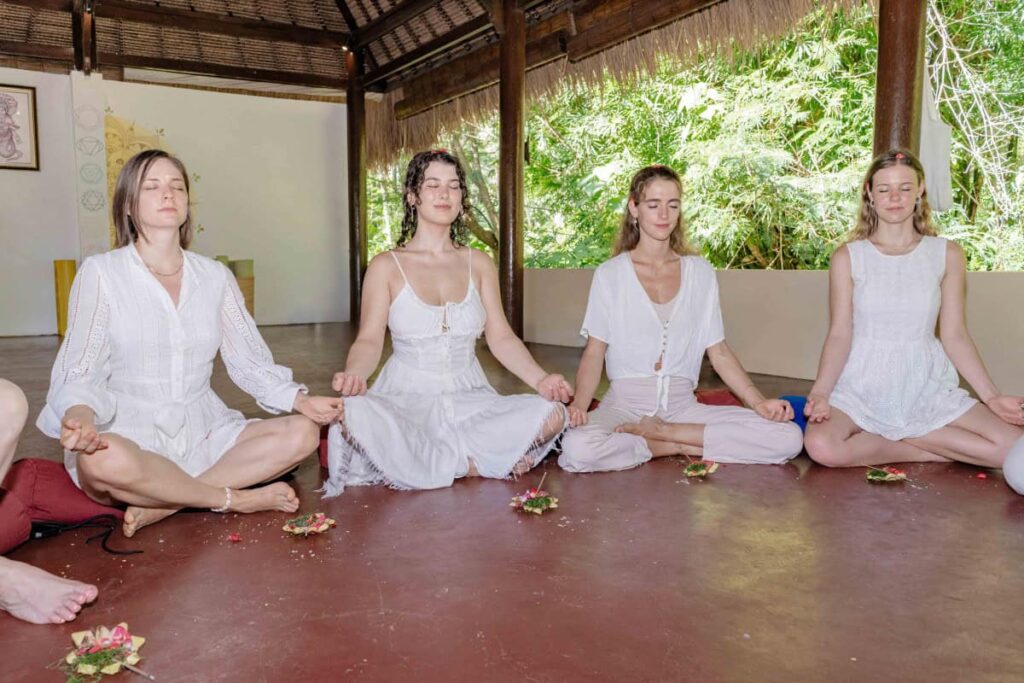The 200-hour Yoga Teacher Training Course (TTC) is a foundational program that equips aspiring yoga teachers with the skills, knowledge, and experience necessary to teach yoga confidently and safely. This course is recognized worldwide and serves as the minimum qualification required to teach yoga professionally. In this guide, we will explore the key elements of a 200-hour yoga teacher training course, including its curriculum, benefits, and what to expect during the training.
What is a 200-Hour Yoga Teacher Training Course?
A 200-hour Yoga Teacher Training Course is an intensive program designed to provide a deep understanding of yoga, its philosophies, and teaching methodologies. This course is typically structured over a period of four weeks, though some schools offer extended options spread over several months. The curriculum covers a wide range of topics, including yoga asanas (postures), pranayama (breath control), meditation, anatomy, and yoga philosophy.
Curriculum Overview
The curriculum of a 200-hour yoga teacher training course is comprehensive and diverse, ensuring a well-rounded education for future yoga instructors. Below is an overview of the key components:
- Yoga Asanas (Postures): This segment focuses on the practice and teaching of yoga postures, covering alignment, adjustments, and modifications. Students learn how to sequence classes and create safe, effective yoga practices for different skill levels.
- Pranayama (Breath Control): Pranayama techniques are taught to help students understand the importance of breath in yoga practice. Different types of pranayama, such as Ujjayi, Nadi Shodhana, and Kapalabhati, are explored in detail.
- Meditation: Meditation practices are an integral part of the training, guiding students in techniques to cultivate mindfulness and inner peace. Various meditation styles, such as mindfulness meditation, mantra meditation, and guided visualization, are included.
- Anatomy and Physiology: A thorough understanding of anatomy and physiology is crucial for safe yoga practice. This section covers the musculoskeletal system, nervous system, and how yoga postures affect the body.
- Yoga Philosophy: Students delve into the ancient texts of yoga, such as the Yoga Sutras of Patanjali, the Bhagavad Gita, and the Hatha Yoga Pradipika. This provides a solid philosophical foundation to support their teaching.
- Teaching Methodology: This component prepares students to lead classes with confidence. It includes teaching techniques, communication skills, and the ethical guidelines of being a yoga instructor.
Benefits of Completing a 200-Hour Yoga Teacher Training Course
Completing a 200-hour yoga teacher training course offers numerous benefits, both personally and professionally:
- Personal Growth: This journey encourages deep self-reflection and personal growth, fostering a greater connection with oneself. The training often leads to a transformation in lifestyle and mindset.
- Enhanced Yoga Practice: Participants develop a stronger, more disciplined yoga practice. They gain a deeper understanding of each posture and learn to practice with greater awareness and precision.
- Teaching Skills: Graduates are equipped with the skills to teach yoga confidently. They learn how to create inclusive, safe environments for students of all levels.
- Career Opportunities: A 200-hour yoga certification opens up opportunities to teach yoga professionally. Whether teaching in studios, gyms, or hosting private sessions, this certification is recognized globally.
What to Expect During the Training
A 200-hour yoga teacher training course is both physically and mentally demanding. Here’s what participants can expect:
- Daily Schedule: Most programs have a structured daily schedule that includes early morning practices, lectures, and workshops. The day typically starts with meditation and asana practice, followed by classes on anatomy, philosophy, and teaching methodology.
- Community and Support: Training often takes place in a group setting, fostering a sense of community and mutual support among participants. This shared experience can lead to lasting friendships and a supportive network of fellow yoga practitioners.
- Assessment and Certification: Throughout the course, students are assessed on their understanding and application of the teachings. This may include written exams, teaching practicums, and personal reflections. Upon successful completion, participants receive a 200-hour certification, recognized by the Yoga Alliance.
Choosing the Right 200-Hour Yoga Teacher Training Course
Selecting the right course is crucial for a successful training experience. Here are some factors to consider:
- Accreditation: Ensure that the course is accredited by a recognized organization like the Yoga Alliance. This guarantees that the curriculum meets industry standards.
- Location: The training environment can significantly impact your experience. Consider whether you prefer a local course or an immersive experience in a yoga retreat setting.
- Instructors: Research the qualifications and experience of the instructors leading the course. A knowledgeable and experienced teacher can greatly enhance your learning.
- Reviews and Recommendations: Read reviews and seek recommendations from past students. Their experiences can provide valuable insights into the quality of the training.
Final Words
A 200-hour Yoga Teacher Training Course is a transformative journey that lays the foundation for a fulfilling career in yoga. It offers deep insights into yoga practice and philosophy, equips students with essential teaching skills, and fosters personal growth. Whether you’re looking to teach or simply deepen your practice, this course is a valuable investment in your yoga journey.
FAQ: 200-Hour Yoga Teacher Training Course
1. What is a 200-Hour Yoga Teacher Training Course?
A 200-hour Yoga Teacher Training Course (TTC) is a foundational program that equips participants with the skills and knowledge to become certified yoga instructors. It covers various aspects of yoga, including asanas (postures), pranayama (breathing techniques), meditation, anatomy, philosophy, and teaching methodology.
2. Who is eligible to enroll in a 200-Hour Yoga Teacher Training Course?
The course is open to anyone with a passion for yoga, regardless of their level of experience. While some programs may recommend a minimum of 6 months to 1 year of regular yoga practice, beginners who are committed to learning are also welcome.
3. Do I need to be an advanced yoga practitioner to join the course?
No, you don’t need to be an advanced practitioner. The course is designed to accommodate students of all levels, from beginners to advanced practitioners. What’s most important is your dedication and willingness to learn.
4. What is the typical duration of a 200-Hour Yoga Teacher Training Course?
The course typically lasts 4 weeks if taken as an intensive program. However, some schools offer part-time or extended formats that can last several months, allowing participants to balance their training with other commitments.
5. What will I learn in a 200-Hour Yoga Teacher Training Course?
The curriculum includes:
- Asana Practice: Detailed instruction on various yoga postures, their alignment, benefits, and modifications.
- Pranayama: Breathing techniques to enhance energy flow and mental focus.
- Meditation: Practices to cultivate mindfulness and inner peace.
- Anatomy and Physiology: Understanding how yoga affects the body and how to practice safely.
- Yoga Philosophy: Study of ancient texts like the Yoga Sutras, Bhagavad Gita, and more.
- Teaching Methodology: Techniques for teaching, class sequencing, and student interaction.
6. Is the 200-Hour Yoga Teacher Training Course certified?
Yes, most 200-hour TTCs are certified by organizations like the Yoga Alliance. Upon successful completion of the course, you will receive a certificate that qualifies you to teach yoga professionally.
7. What is the Yoga Alliance, and why is its certification important?
The Yoga Alliance is a globally recognized organization that sets standards for yoga teacher training. A Yoga Alliance certification ensures that your training meets industry standards, making your qualification valid and recognized worldwide.
8. What should I expect during the training?
You can expect an intensive and immersive experience. A typical day includes:
- Morning practice: Meditation, pranayama, and asana practice.
- Lectures: Classes on anatomy, philosophy, and teaching methodology.
- Workshops: Practical sessions focusing on alignment, adjustments, and teaching practice.
- Homework: Assignments, readings, and self-study.
9. How can I prepare for a 200-Hour Yoga Teacher Training Course?
- Physical Preparation: Regular yoga practice leading up to the course can help condition your body.
- Mental Preparation: Cultivate a mindset of openness and readiness to learn.
- Study: Familiarize yourself with basic yoga concepts, terminology, and philosophy.
10. What should I bring to the training?
- Yoga Mat: A comfortable and supportive mat.
- Yoga Props: Blocks, straps, and blankets, if not provided by the training center.
- Comfortable Clothing: Breathable, flexible clothing for practice.
- Study Materials: Notebooks, pens, and any required reading materials.
11. Can I teach yoga after completing the 200-Hour Yoga Teacher Training Course?
Yes, upon successful completion of the course, you will be qualified to teach yoga classes. You can work in yoga studios, gyms, wellness centers, or even offer private lessons.
12. What are the career opportunities after completing a 200-Hour Yoga Teacher Training Course?
Graduates can pursue various opportunities, including:
- Teaching at Yoga Studios: Lead classes and workshops.
- Personal Yoga Instructor: Offer one-on-one sessions.
- Corporate Yoga: Teach yoga in corporate settings.
- Retreat Leader: Guide yoga retreats locally or internationally.
- Online Teaching: Conduct virtual yoga classes and create digital content.
13. How do I choose the right 200-Hour Yoga Teacher Training Course?
Consider factors such as:
- Accreditation: Ensure the course is Yoga Alliance certified.
- Instructors: Look for experienced and reputable teachers.
- Location: Choose a setting that aligns with your personal and lifestyle preferences.
- Curriculum: Review the course content to ensure it meets your learning goals.
- Reviews: Read testimonials from past students to gauge the quality of the training.
14. What if I don’t want to teach yoga? Can I still take the course?
Absolutely! Many people enroll in the course not to teach but to deepen their personal practice and understanding of yoga. The training can be a transformative personal journey, regardless of whether you intend to teach.
15. How much does a 200-Hour Yoga Teacher Training Course cost?
The cost varies widely depending on the location, duration, and reputation of the course. Prices can range from $1,500 to $5,000 or more, including tuition, accommodation, and meals.
16. Are there any prerequisites for enrolling in a 200-Hour Yoga Teacher Training Course?
Most programs do not have strict prerequisites. However, it’s beneficial to have some prior experience with yoga and a commitment to the practice. Some schools may require a brief application or interview process to ensure a good fit.
17. Will I need to pass an exam to complete the course?
Yes, most programs require students to pass written exams, practical assessments, and teaching practicums to ensure they have absorbed the material and can teach effectively.
18. What support is available after completing the course?
Many schools offer post-graduation support, such as mentorship programs, continued education, and access to a community of fellow graduates. This support can help you as you begin your teaching career or deepen your practice.
19. Can I retake the course if I need to?
Some schools offer the option to retake parts of the course if necessary. It’s best to check with the specific training provider about their policies on retakes or make-up sessions.
20. What are the benefits of completing a 200-Hour Yoga Teacher Training Course?
The benefits include:
- Deepened Personal Practice: Enhanced understanding of yoga and its benefits.
- Professional Qualification: Certification to teach yoga globally.
- Personal Growth: A journey of self-discovery and transformation.
- Community: Connection with like-minded individuals and a supportive network.



